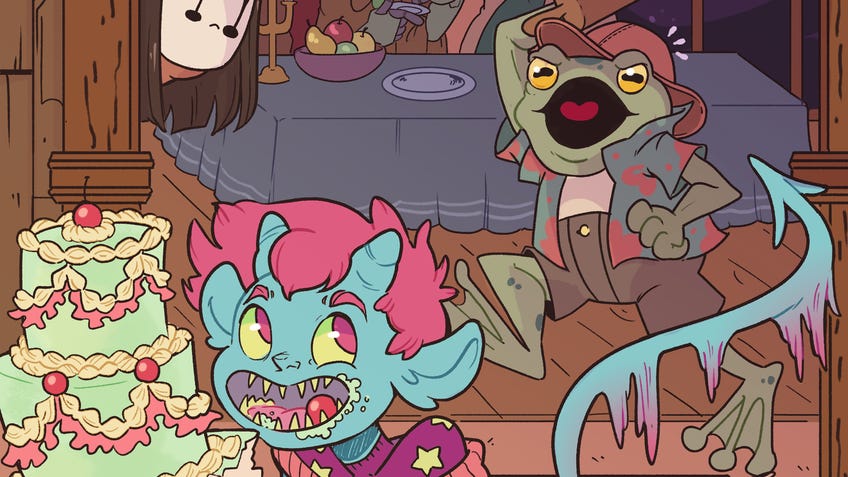Yazeba’s Bed & Breakfast is like an episodic Spirited Away that’s part RPG, part legacy game - preview
The next GM-less storytelling game from Wanderhome and Wickedness creators.
Nestled in the heart of an isolated forest sits a home filled with residents looking for a future they can’t see, where it is always September 15th. Co-created by Jay Dragon and M Veselak, Yazeba’s Bed & Breakfast uses GM-less play systems similar to publisher Possum Creek Games’ other narrative games, Wanderhome and Wickedness.
Players guide the residents of the titular bed & breakfast through the trials and tribulations of managing a magical hotel filled with guests right out of a work akin to Studio Ghibli’s Spirited Away. We spent some time with the upcoming RPG’s ashcan, ahead of its planned Kickstarter next year.
While Spirited Away is a touchstone for Yazeba’s tone, Dragon and Veselak likens the game’s serialised structure and tone to works like Moomins and Foster’s Home For Imaginary Friends. Separated into 12 curated chapters, this early release asks you to work with a chosen group of friends to chart the growth of each resident who has come to call the bed and breakfast home.
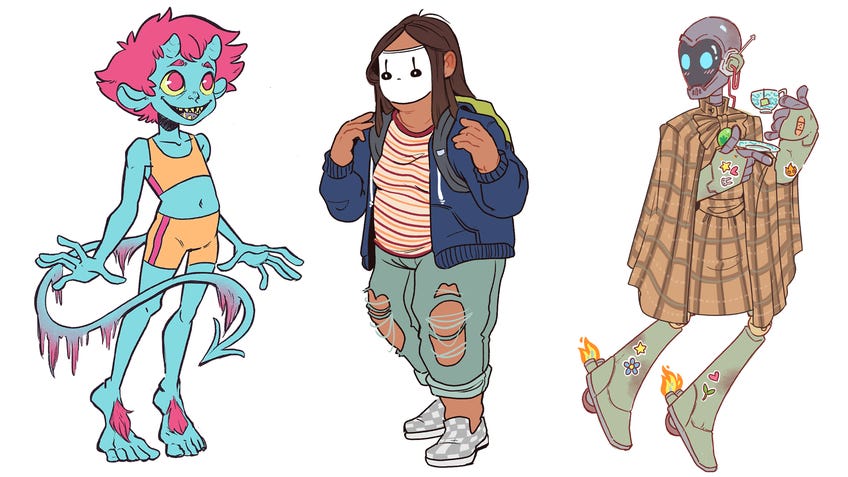
While there is no GM in play, Yazeba’s does ask whomever claims responsibility for the book to pick up the role of Concierge. As the concierge, you’ll have the added responsibility of guiding new players through chapters and act as the caretaker of the physical ephemera you and your group will collect through play.
Veselak likens the game’s serialised structure and tone to works like Moomins and Foster’s Home For Imaginary Friends.
Yazeba’s will have you play as several characters who have either found or are looking for something at the B&B. These include Hey Kid, a rambunctious devil-child; Amelie, a robotic maid; Sal, a young witch's apprentice turned musician; and Gertrude, a young masked runaway and the newest resident of the bed and breakfast.
In the ashcan, players find a character sheet to fill them in on facts about the residents, personal ‘Bingo' and ‘Whoopsie’ triggers, and their first Journey track, which tells you how the characters of Yazeba’s will grow in the earlier chapters.
During play, everyone will perform a few Bingos and Whoopsies, some of which will be specific to a character, or added as part of a chapter. Bingos are described as moments when characters can “fully assert who they are” to express growth, while a Whoopsies is akin to ”a bad habit, an old fault” that might negatively affect progress on a journey track. Each character’s Whoopsie might be another’s Bingo, which creates an interesting interplay between characters. For example, one of Gertrude’s Whoopsies - “Reject the help of someone else” - can often be a prime setup for Amelie’s “Make someone’s life easier without them realising” Bingo. Each character’s journey is unique to the specific challenges they are facing; Gertrude’s starting track is a list of events that chronicle her becoming a full-time resident at Yazeba’s.
Bingos are described as moments when characters can “fully assert who they are” to express growth.
Yazeba’s Bed & Breakfast also asks players to step into the shoes of guests, many of whom are staying at the B&B to rest before continuing on their journey. Because they are not as heavily involved with the game’s larger narrative, guests allow you to interact with personalities who aren’t looking to improve in the way the main residents are. While each has their own emotional journey for players to explore, completing the tracks of many guest characters results in them leaving the B&B or simply resetting their track.
“Guests kind of have a lower-stakes journey, or a lot of them have journeys that will take them away from the bed and breakfast,” Veselak says. “They’re trying to make one decision, more or less, rather than find their place at the bed and breakfast specifically.”
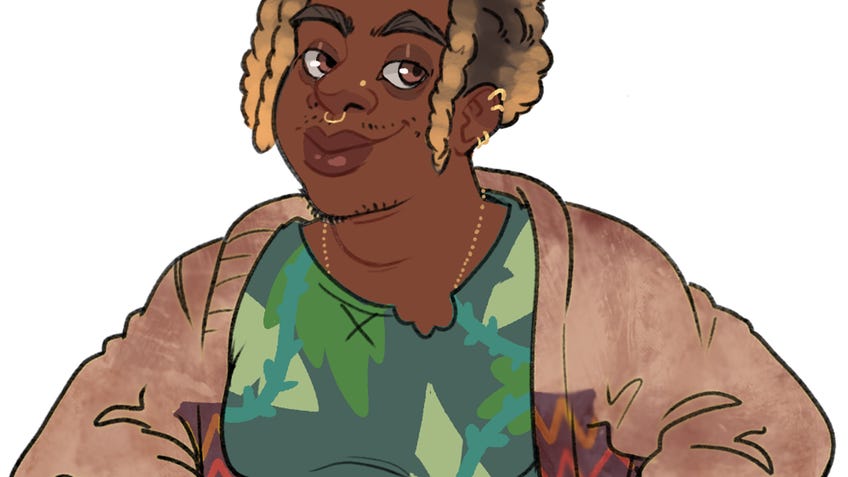
The actual gameplay of Yazeba’s is perhaps best described as playing through a series of thematically connected micro-RPGs. While each chapter features similar gameplay (players will always perform Bingos and Whoopsies and fill a track to progress the story), several also ask players to manage resources including chaos coins, tokens, scrap paper or a deck of cards. The mechanics of every chapter are somewhat determined by one of four assigned moods: eerie, pensive, frantic and relaxed.
Dragon describes chapter moods as anchor points. Frantic chapters use chaos coins to simulate rising tensions in a stressful scenario. Relaxed moods play similarly to other Belonging Outside Belonging games, such as Wanderhome, where players exchange tokens to express their character’s behaviour and actions. If a chapter calls for players to use a deck of cards, things are probably about to get eerie.
The actual gameplay of Yazeba’s is perhaps best described as playing through a series of thematically connected micro-RPGs.
During chapters with a pensive mood like ‘Firefly Catching,’ Yazeba’s has players collect and exchange tokens while musing over a few questions relating to the chapter’s themes. As players work towards an answer, they’ll take tokens off a character’s starting questions, such as “Does being a grown-up mean losing your passion for life?” By the end of the chapter, players will be asked to answer a central question related to the anxieties of all characters involved, like “What does it mean to change?”
While moods will always give you an understanding of what a chapter is going to entail, none play exactly the same. Dragon and Veselak want Yazeba’s to surprise players as they dig deeper into the book. “If you can’t be 100% prepared, then you’ll finally believe us when we tell you 10% prepared is enough,” Veselak says.
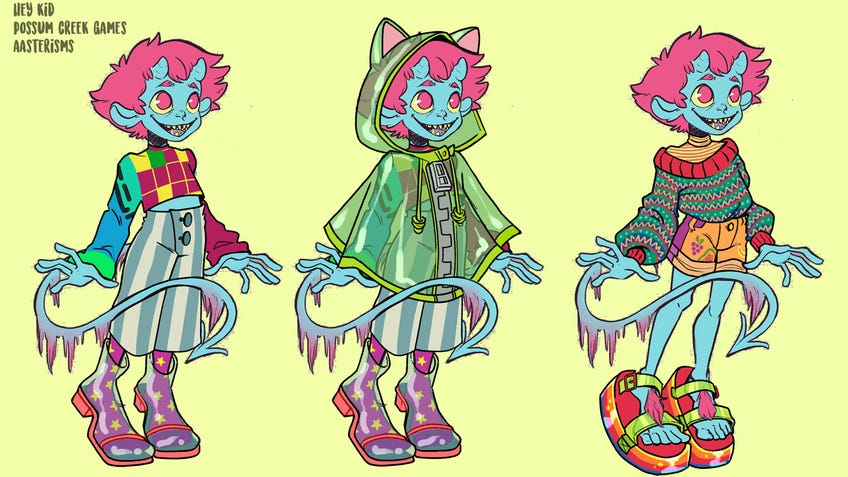
The final chapter in the locked section of the ashcan, ‘Snow Day’, has players working to answer a list of seven starting questions. The chapter is unlocked through play, so you will not interact with it before you understand the game. In the back of the ashcan, you’ll find two Shelves with Nooks, spaces to put items earned through play called Mementos. Once you get a memento, you can place it over the square next to where it says ‘Unlock X’ and gain access to locked content. If Hey Kid can answer every question they list during ‘Snow Day,’ they receive the Knit Cap Memento.
For Veselak, locking content behind a soft wall is meant to keep players from accessing things that might not resonate with them without the needed emotional buy-in provided by earlier chapters, or the mechanical knowledge to understand how this content subverts the game loop established by earlier chapters. Mechanics like this are similar to legacy board games, such as Pandemic Legacy.
“Yazeba’s is easy to digest partially because we’ve created these little walls where you are familiar enough with our bag of tricks before we start pulling out the more advanced tricks later on,” zey say.
Yazeba’s creates a sort of chronology within its chapters by using the passage of seasons. The process of unlocking new content through Mementos contributes to the game’s legacy mechanics - including more advanced guests and second resident tracks - which Dragon says helps keep players invested in a game that plays like a series of one-shots.
Locking content behind a soft wall keeps players from accessing things that might not resonate with them without the needed emotional buy-in.
“There is this kind of aspirational quality to the locked portions of the game,” Dragon says. “It is sprawling and we want it to feel very ‘Oh, you could go so deep on this.’”
Yazeba’s uses stickers to represent Mementos. There are no stickers in the ashcan (I used sticky notes and old cut-up band aids), but Dragon says some will be included in the Kickstarter. By filling in Nooks, you’ll start unlocking new guests, like a magician’s apprentice and her oblivious dad, and new chapters.
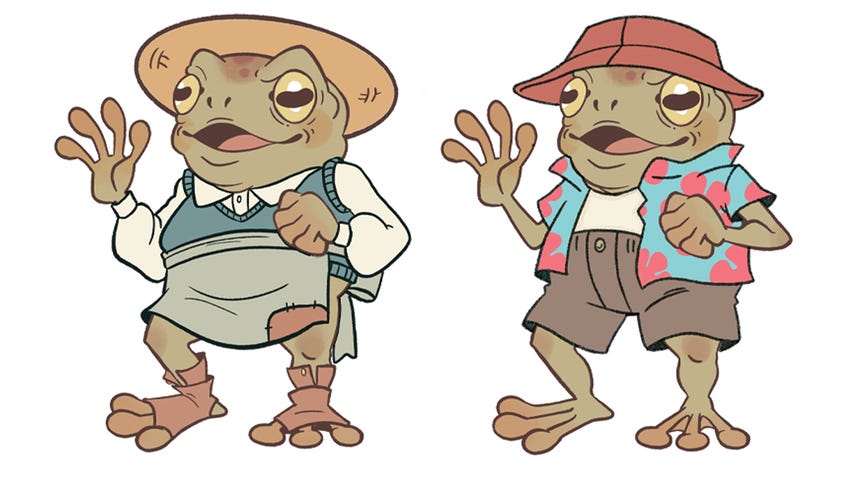
As you go through (and replay) chapters to fill out tracks, you will keep using stickers to fill the many Nooks and pages of Yazeba’s Bed & Breakfast. The act of filling these Nooks as a group can turn even the printed-out PDF of this ashcan into an artefact unique for each group playing through the game.
Even though it is the bones of what’s planned, Yazeba’s ashcan efficiently illustrates how each copy might itself have a story unique to anyone who decides to engage with its structure and long-term mechanics.
A Kickstarter campaign for Yazeba’s Bed & Breakfast launches in March 2022. The ashcan can be downloaded from Possum Creek Games’ Itch.io page for free.
